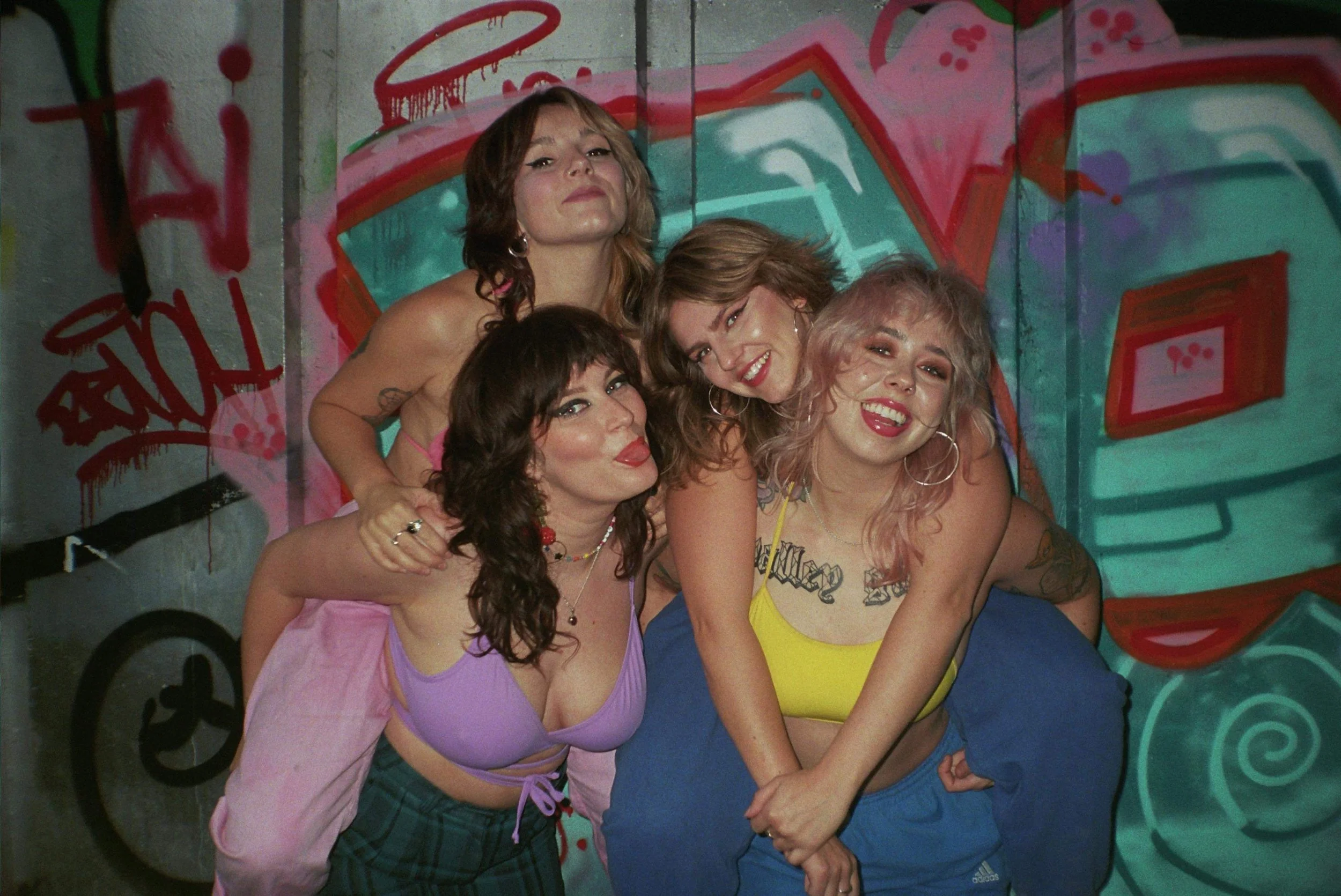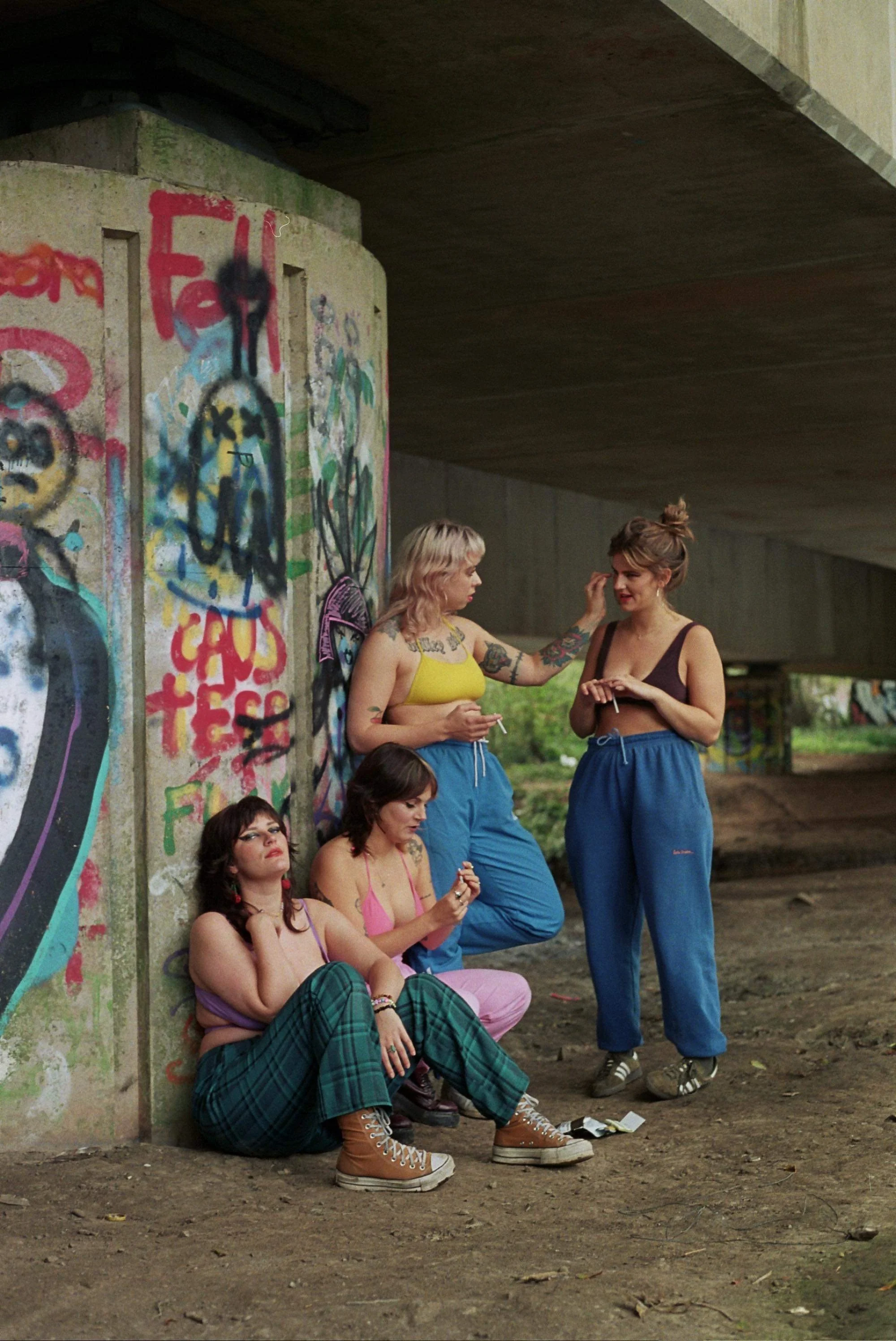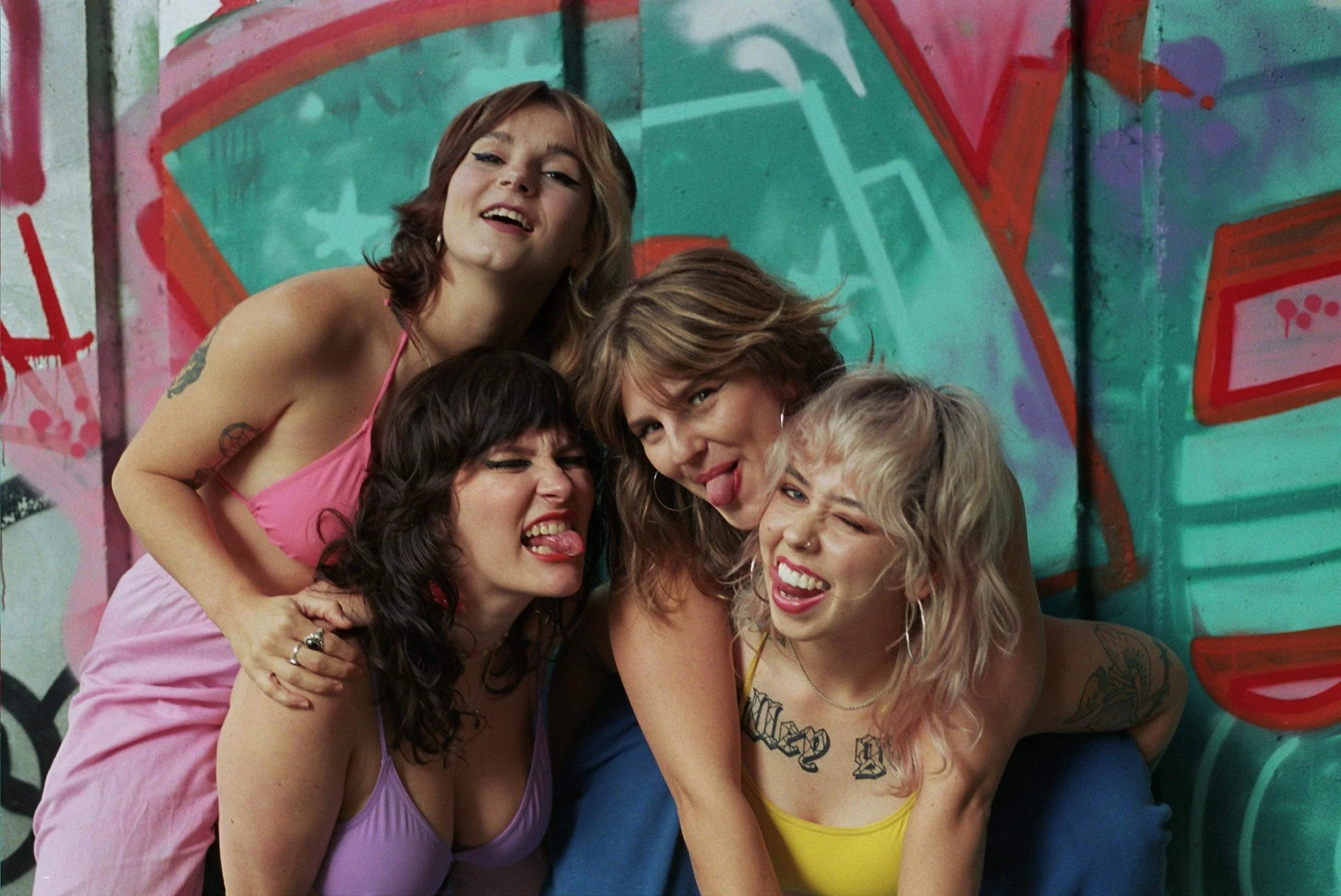Panic Shack: Don't Shush Me In The Cinema
At the beginning of this year, I started dating my now-girlfriend. At that time, I was doing everything typical of anyone trying to impress a crush. I held open doors and offered to pay for drinks, I quadruple-checked my outfits before leaving the house for dates and posted strategically on Instagram stories which suggested I was *available*. Most of all, I was avoiding embarrassing myself. I didn’t want to give my girlfriend “the ick” – a phenomenon made famous by TikTok, described by The Urban Dictionary as: “Something someone does that is an instant turn-off for you, making you instantly hate the idea of being with them romantically.”
Cue Steve Lamacq playing ‘The Ick’, Panic Shack’s hit 2022 single riffing on the phenomena, on his BBC 6Music show. I’m walking down the street with my Airpods in when I hear the lyrics: you basically handed me the hammer / practically placed the nail on to the wood / smashed that nail firmly into the coffin when you / let out a shush / you shushed me in the cinema! / he shushed me in the cinema / you DO NOT SHUSH ME IN THE CINEMA!
My blood runs cold. Just that week, I’d been to see ‘The Godfather’ on a date. Was it possible? Could I be that guy? Did I shush my crush in the cinema!? If I did, it didn’t give Maisie the ick. So far, I’ve avoided that. As it turns out, what gives one person the ick might not gross out another. I discovered this when I interviewed two members of Panic Shack, Meg and Emily, earlier this year, on the first rainy day in a Summer of drought. We’re playing ‘Ick or No Ick’, a game I’ve invented to see just what makes the band tick, and what gives them the ick.
On the subject of dressing gowns, they are so far divided. “That’s an ick for me,” Emily replies. Meg looks sheepish. She is dressed in a pink and red vest, large tortoiseshell glasses, with a faux leather love heart pinned to her ear. “I’m gonna say no ick. Because I have one and wear one… Emily came over at half-eight yesterday morning and I was literally in my dressing gown,” she says eventually.
Meg now addresses Emily. “Did I give you the ick?” Emily shakes her head lightly, then whispers, “No.” Oops, maybe I’ve rocked the boat. But Meg and Emily are not partners, only bandmates. However, who’s to say the ick can’t occur between bandmates? I keep asking. Being a Soundcloud Rapper was met with unquestionable approval. “No ick,” they say. But what about leaving a zit un-popped? “Ick,” they answer in unison. The final question seeks their opinion on playing ‘Dungeons and Dragons’. The girls look at each other. Their viewpoints are divided again. Meg quickly retorts, “No ick.” Emily says, “Ick.” So, there we have it. The ick, whatever it is, is highly personal.
Credit: Ren Faulkner
Panic Shack’s rise has been slow but certain. The early singles, ‘Who’s Got My Lighter, Jiu Jits You’, and ‘I Don’t Really Like It’ – all of which feature on their 2022 EP, ‘Baby Shack’ – were released during lockdown. This year has seen their first big festival shows after dates played with likeminded bands, Grandmas House, Buzzard Buzzard Buzzard, and Shame, in the first quarter of the year. Already they’ve played gigs supporting their heroes, Amyl and the Sniffers. And with growing support from radio gatekeepers Steve Lamacq, Radio 1’s Daniel P. Carter and Kerrie Kosh, the band have built a steady wave of support which will lend momentum to their future releases.
But how did they get together? The story of Panic Shack’s formation is almost mythic. Half the band could not play the guitar when the band formed and, true to their music’s spirit, the “idea” of Panic Shack came about in rebellion to the majority-boybands populating their local music scene.
“We used to go to see an Indie band in Cardiff called Rainbow Maniac…as the supportive fans,” Emily says. “They’d be setting up and we’d be on the street getting everybody in.” Meg joins in. “Their songs were great, so there’s no shade on it. It’s just, we supported so many of their gigs, so we were like ‘let us have a go now.’”
Thus begins Panic Shack. Quickly, the girls got together and started jamming, then they started writing songs. But almost as quick as the band formed, their fans, and critics, rushed to pin a label on them. Many listeners of the band have considered them part of the growing punk renaissance, at the forefront of which are acts such as Viagra Boys, Petrol Girls, and Bob Vylan. After such an organic formation, one where the band found themselves jamming without any particular sound to aim for, any message they collectively wished to put forward, such interference from outside has led the band to question just what they’re playing, and what they’re saying. A former interview with the band quoted them as rejecting punk. When I put this to them, they disagreed.
“You know, we’ve all got a message we’re trying to get across. I don’t think it [punk] is something you can choose. If you’re in an environment where, like, working-class culture… we kind of are punk without being punk”
“In regard to attitude, we’re definitely a punk band,” Emily says. “You know, we’ve all got a message we’re trying to get across. I don’t think it [punk] is something you can choose. If you’re in an environment where, like, working-class culture… we kind of are punk without being punk. But, down to the label thing… we don’t want to be boxed in because we don’t want to disappoint people if it doesn’t really sound like a punk song.”
“Cause some of our songs don’t sound like punk songs,” Meg adds. “Someone said recently, we’re Indie-punk. I can vibe with that if we have to give it a genre.” To which Emily adds. “It’s not about rejecting the label, it’s just kind of, like, ‘we ain’t always gonna sound like that so don’t expect us to be so one-dimensional.’”
Panic Shack does not so much reject the label, punk, as they want to negotiate with it. They are aware that certain elements of their music may not be completely typical whilst being aware of potential ambitions which are not punk that they might want to pursue as a group. Really, their “rejection” of punk is done out of respect for the genre and its fans.
Is this the same with the feminist label, then? As a culture, music journalism sometimes makes the error of branding every female band as necessarily feminist just because they’re addressing women’s issues. Sometimes, they brand an act as feminists just because they are not men. Panic Shack have been referred to as feminist-punk, perhaps by fans who see in their music the influence of Amyl and the Sniffers, or the Petrol Girls. Historically, the music industry has not been consistently kind to female bands. Some of the worst offenders are genre-faithful men who see music made by women in the genre they adore as an invasion. Panic Shack have had some negative comments in this regard. In other places, they’ve been surprised.
Credit: Ren Faulkner
“A lot of old men love us,” Meg says. Which you would not necessarily expect. “We have all the Radio 6 guys,” Emily adds. “That’s the majority of our audience.” Meg agrees. “They’re the best. They love us.”
“We’ve had some sexist comments,” Emily chimes in. “But nothing much to do with music. We’ve had like, ‘they’ve just got four more clitorises than us,’ or ‘if I had tits maybe I’d be on the radio’ [messages from jealous trolls].”
“It goes without saying that we’re feminist,” Meg says, to which Emily adds. “We don’t sit down and think, ‘let’s write feminist tracks.’ It’s just our experiences.” Meg ponders. “And people can interpret it how they want.”
So, that settles it. Panic Shack are feminists, and maybe punk. Punk-for-pay? It’s your choice. If you like thinking of them as a punk band, do. If the idea of their being punk is to you a blight on your pure genre, don’t worry about it. They’re as fluid as you like.
With labels out the way, the band begin discussing their recent history. So far, their career has not been entirely without its problems. To date, they have had multiple drummers. They have just finished the audition process for their new drummer, with whom they’re currently practicing and writing. Now that they’ve got a solid line-up, their music has been released and well-received, the band are able to consider the nature of their songwriting and the thematic framework which acts as its scaffolding. If ‘Baby Shack’ could be characterised as a group of tracks vocalising the often-overlooked experiences of young women in social settings, their new work, they say, deals more with the realities of ‘making it work’ as a working-class band.
“We, as musicians, are kind of struggling at the minute, because we’re all working full-time, we’re all fucking skint. Some of us work nights, some of us work evenings, days, nine-to-fives. We find it really hard to meet up and write”
“I’ve started, with writing these new songs… to realise the influences of our music more.” Meg says. Emily adds. “With the newer songs we’ve been doing there is a little bit of a theme to them, and it’s hard not to write along that theme ‘cause we, as musicians, are kind of struggling at the minute, because we’re all working full-time, we’re all fucking skint. Some of us work nights, some of us work evenings, days, nine-to-fives. We find it really hard to meet up and write.” Meg concurs. “It is really difficult, but I think that’s gonna be what makes our songs different. I think, we’re living it, and it’s gonna sound like it.”
This is a common theme in the recent interviews I’ve conducted. The rising cost of living, exacerbated by a government focused more on maximising take-home pay for C.E.Os than nurses, is suppressing many bands’ creativity. Momma – who I interviewed earlier this year – described the long-hours-low-pay-life, which characterises many young people’s mode of existence, as creatively stifling. Panic Shack, by comparison, seem to want to utilise the imperfect standards by which many of us are forced to live as fuel for their art. If wage labour is, for many artists, a straight-jacket, Panic Shack are Houdini, using economic pressures to their creative advantage, to wow audiences around the country.



